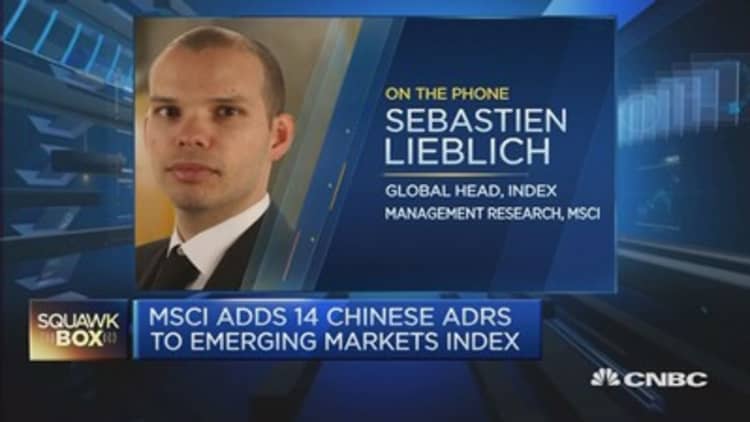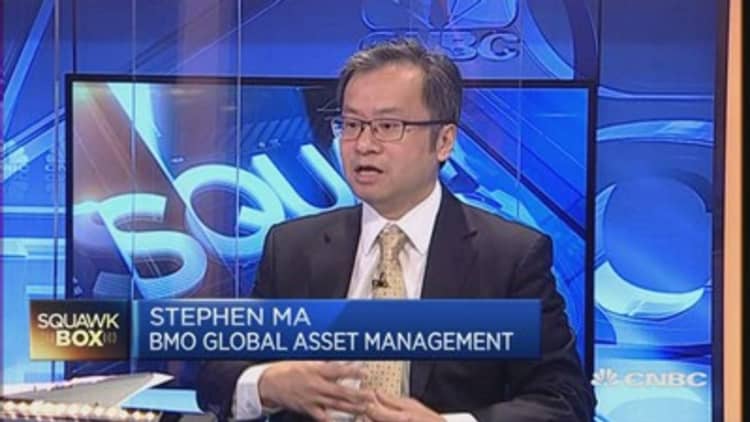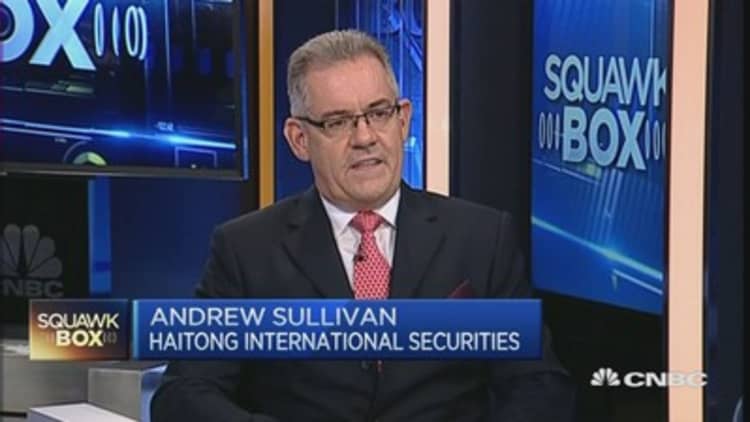


Adding U.S.-listed Chinese companies to MSCI's Emerging Markets (EM) index is not a gateway for the long-anticipated A-share inclusion, according to the global index provider.
"This decision is absolutely independent from any consideration of adding A-shares to the EM index. It's a much broader move," Sebastien Lieblich, MSCI's global head of index management research, told CNBC on Friday. "It just happens that China is strongly impacted by this enhancement in methodology, but there are also other countries [involved]."
Read MoreAlibaba, Baidu join MSCI emerging market index
Companies traded outside of their country of classification, i.e. foreign listed firms, were previously excluded from MSCI's regional indexes.
On Thursday, MSCI announced several changes to its equity indexes following the conclusion of its semi-annual review, with 14 tech-oriented Chinese names to be added to its $3.5 trillion market-cap EM index: Alibaba, Baidu, 58.com, Ctrip.com, JD.com, NetEase, New Oriental Education, Qihoo 360 Technology, Qunar, SouFun Holdings, TAL Education, VipShop, Youku Tudou and YY.
In addition to the Chinese firms' EM inclusion, U.S.-listed NXP Semiconductors will be added to MSCI's Netherlands Index and Singapore-listed Hongkong Land will go under its Hong Kong Index.
All changes announced on Thursday will be implemented as of the close of November 30 and MSCI said it will first add the foreign-listed companies at half their free float-adjusted market cap, and add the remaining market capitalization at the May 2016 semiannual index review.
The news comes as MSCI reviews stocks listed in mainland China, known as A-shares, for inclusion in the EM index. At a review in June, MSCI declined to immediately add the A-shares, saying inclusion was possible after structural issues, such liquidity and ownership, are resolved.
With Thursday's new additions, the weighting of Chinese stocks in the EM Index will rise to 26 percent, from 23 percent previously. The rebalancing could see around $7 billion move into these American Depository Receipts (ADRs) on the back of buying from funds that passively track the index.
"As these new constituent stocks are more geared towards domestic consumption and 'New China,' it could attract flows from actively-managed funds as investors are looking for exciting and sustainable growth stories in the low-growth world," explained Raymond Ma, portfolio manager of Fidelity Funds China Consumer Fund, in a note.
The inclusion of U.S. ADRs could also attract more foreign institutional investors, which should dampen long-term volatility and may see Chinese state-owned enterprises adopt a more shareholder friendly approach to compete for foreign investment, Fidelity added.
Thursday's announcement was in no way a reflection of the shift in China's economy toward more consumer and internet technology stocks, MSCI's Lieblich warned.
Read More Alibaba's record sales don't impress investors much
"We don't target industries or sectors. Any stock that would be listed outside of mainland China becomes eligible. It just happens these are tech stocks...It's not a specific aim of MSCI to increase the coverage of these specific stocks in the [EM] index," he said.
But deliberate or not, the move is likely to result in a few winners and losers.
"Most investors, when they invest in China, (it) is a lot of exposure to banks ... MSCI will increase exposure to tech," said Brendan Ahern, chief investment officer of KraneShares, which offers China-focused ETFs.
"As the inclusion of the ADRs will come largely at the expense of Chinese banks, Chinese banks may underperform in the medium term as they are expected to see some selling," echoed Ma.
— Evelyn Cheng contributed to this report.

